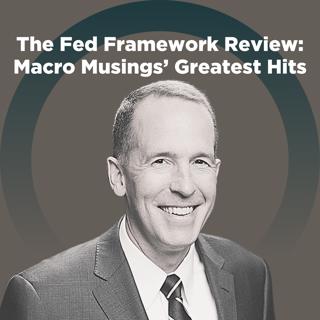
74 - Eric Hilt on Debates in Economic History and the Cliometric Revolution
Eric Hilt is a professor of economics and economic historian at Wellesley College. Today, he joins the show to discuss his new journal article *Economic History, Historical Analysis, and the “New History of Capitalism,”* which examines the growing debate between economic historians and historians of capitalism over issues such as slavery and economic growth. Eric also shares his thoughts on the “Cliometric Revolution,” which transformed the way many economic historians conduct their analysis. David’s blog: macromarketmusings.blogspot.com/ Macro Musings podcast site: macromusings.com David’s Twitter: @DavidBeckworth Eric Hilt’s Wellesley profile: http://www.wellesley.edu/economics/faculty/hilte Related links: *Economic History, Historical Analysis, and the “New History of Capitalism”* by Eric Hilt. Journal of Economic History, June 2017. https://www.cambridge.org/core/services/aop-cambridge-core/content/view/E17BEA48B930F6F25F328B5A79332A6E/S002205071700016Xa.pdf/economic_history_historical_analysis_and_the_new_history_of_capitalism.pdf *Economic Effects of Runs on Early 'Shadow Banks': Trust Companies and the Impact of the Panic of 1907* by Carola Frydman, Eric Hilt, and Lily Y. Zhou. NBER, July 2012 http://www.nber.org/papers/w18264 *Time on the Cross: The Economics of American Slavery* by Robert Fogel and Stanley Engerman https://www.amazon.com/Time-Cross-Economics-American-Slavery/dp/0393312186 *Railroads and American Economic Growth: Essays in Econometric History* by Robert Fogel *Old South, New South: Revolutions in the Southern Economy since the Civil War* by Gavin Wright https://www.amazon.com/Old-South-New-Revolutions-Southern/dp/0807120987
11 Syys 201759min

73 - JW Verret on Rules-Based Monetary Policy and the CHOICE Act
JW Verret is an associate law professor at the Antonin Scalia School of Law at George Mason University and a senior affiliated scholar at the Mercatus Center. Previously, he served as the chief economist on the House Financial Services Committee. Today, he joins the show to discuss his experience working on Capitol Hill and his thoughts on the CHOICE Act, the current legislation designed to replace the Dodd-Frank Act. David’s blog: http://macromarketmusings.blogspot.com/ Macro Musings podcast site: macromusings.com David’s Twitter: @DavidBeckworth JW Verret’s Mercatus profile: https://www.mercatus.org/j-w-verret JW Verret’s GMU profile: https://www.law.gmu.edu/faculty/directory/fulltime/verret_jw Related links: “Demystifying the Foggy Haze of Federal Reserve Policymaking” by JW Verret http://thehill.com/blogs/pundits-blog/finance/341412-demystifying-the-foggy-haze-of-federal-reserve-policymaking
4 Syys 201757min

72 – Adam Millsap on Regional Business Cycles, State Fiscal Health, and Labor Mobility
Adam Millsap is an assistant director at the L. Charles Hilton Center at Florida State University and a senior affiliated scholar at the Mercatus Center. Today, he joins the show to discuss how different regional economies can lead to business cycles at the regional and state levels, rather than the federal level. This creates difficulty for monetary policy at the federal level as looser monetary policy may be appropriate for states like West Virginia, but may not be appropriate for states like California. He and David also discuss the decline of inter-state labor mobility and how bad regulation deters people from moving to areas with better job prospects. Description: David’s blog: macromarketmusings.blogspot.com/ Macro Musings podcast site: macromusings.com/ David’s Twitter: @DavidBeckworth Adam Millsap’s website: http://adammillsap9.wixsite.com/personal Adam Millsap’s Mercatus profile: https://www.mercatus.org/adam-millsap Adam Millsap’s Twitter: @AA_Millsap Related links: “Recessions Don’t Have the Same Impact on Every City” https://www.forbes.com/sites/adammillsap/2016/07/19/recessions-dont-have-the-same-impact-on-every-city/#58f3a28478d2 “State Fiscal Rankings https://www.mercatus.org/statefiscalrankings
28 Elo 201757min

71 – Betsey Stevenson on Challenges in the U.S. Labor Market
Betsey Stevenson is an associate professor of public policy at the University of Michigan and previously served as the chief economist at the U.S. Labor Department. Today, she joins the show to discuss her experience working at the Labor Department at a time of high unemployment as well as her more recent research on challenges in the U.S. labor market. Specifically, she talks about the problem of decreased male labor force participation and why “manly men need to do more girly jobs.” David’s blog: http://macromarketmusings.blogspot.com/ Macro Musings podcast site: https://macromusings.com/ David’s Twitter: @DavidBeckworth Betsey Stevenson’s University of Michigan profile: http://fordschool.umich.edu/faculty/betsey-stevenson Betsey Stevenson’s Twitter: @BetseyStevenson Related links: “Manly Men Need to More Girly Jobs” by Betsey Stevenson https://www.bloomberg.com/view/articles/2016-12-07/manly-men-need-to-do-more-girly-jobs “Want to Help the Economy? Learn to Trust” by Betsey Stevenson https://www.bloomberg.com/view/articles/2016-07-05/want-to-help-the-economy-learn-to-trust “Trust in Public Institutions over the Business Cycle” by Betsey Stevenson and Justin Wolfers http://users.nber.org/~bstevens/Papers/TrustinPublicInstitutions.pdf
21 Elo 20171h 3min

70 - Greg Mankiw on Macroeconomists as Scientists and Engineers
Greg Mankiw is a professor of economics at Harvard University and served as the chair of the Council on Economic Advisers under President George W. Bush. Today, he joins the show to discuss the history of macroeconomics and how macroeconomists function as both scientists, who formulate and test theories, and as engineers, who set out to solve real world problems. Greg also shares his thoughts on the debate between the New Keynesian School and New Classical School and how that debate has shaped how we think about economics. David’s blog: macromarketmusings.blogspot.com/ Macro Musings podcast site: macromusings.com/ David’s Twitter: @DavidBeckworth Greg Mankiw’s Harvard profile: https://scholar.harvard.edu/mankiw/home Greg Mankiw’s blog: https://gregmankiw.blogspot.com/ Related links: “The Macroeconomist as Scientist and Engineer” by Greg Mankiw https://scholar.harvard.edu/files/mankiw/files/macroeconomist_as_scientist.pdf Macroeconomics by Greg Mankiw https://www.amazon.com/Macroeconomics-N-Gregory-Mankiw/dp/1464182892
14 Elo 201758min

69 – Edward Harrison on the Political Economy of the Eurozone
Edward Harrison is a consultant with Global Macro Advisers and founder of the investment news blog *Credit Writedowns.* Today, he joins the show to discuss the political forces that led to the establishment of the Eurozone and the turmoil that has plagued it since the Great Recession. Edward also shares his thoughts on whether the Eurozone will survive. David’s blog: http://macromarketmusings.blogspot.com/ Macro Musings podcast site: https://macromusings.com/ Edward’s blog: https://pro.creditwritedowns.com/ David’s Twitter: @DavidBeckworth Edward Harrison’s Twitter: @edwardnh Related links: “Macron Will Need to Target Reforms Like a Laser” by Edward Harrison http://www.businessinsider.com/macron-will-need-to-target-reforms-like-a-laser-2017-5 “Some Pre-European Debt Crisis Signs are Popping Up Again” by Edward Harrison http://www.businessinsider.com/some-pre-european-debt-crisis-signs-are-popping-up-again-2017-4
7 Elo 20171h 1min

68 - Scott Sumner on Fed Performance since the Great Recession
In this week’s episode in front of a live audience, Scott Sumner, the director of the Program on Monetary Policy at the Mercatus Center and blogger at *The Money Illusion,* returns to the show to share his thoughts on the Federal Reserve’s performance from the Great Recession to the present. Scott explains how forecast targeting and price level targeting could have mitigated the economic decline in 2008 and 2009. He also shares his thoughts on how the cognitive biases of central bankers can cause them to make mistakes in evaluating the stance of monetary policy and offers some solutions to address this problem. Note: this episode was recorded as part of a special Mercatus Center event in June 2017. David’s Twitter: @DavidBeckworth David's blog: macromarketmusings.blogspot.com Scott’s Mercatus profile: https://www.mercatus.org/scott-sumner Scott's blog: www.themoneyillusion.com/ Related links: *The Midas Paradox: Financial Markets, Government Policy Shocks, and the Great Depression* by Scott Sumner https://www.amazon.com/Midas-Paradox-Financial-Government-Depression/dp/1598131508 “Nudging the Fed Toward a Rules-Based Policy Regime” by Scott Sumner https://www.mercatus.org/publication/nudging-fed-toward-rules-based-policy-regime “Demystifying the Fed” by Scott Sumner https://www.usnews.com/opinion/economic-intelligence/articles/2017-07-10/the-federal-reserve-needs-to-learn-from-its-monetary-mistakes “Inflation Forecasting Targeting: Implementing and Monitoring Inflation Targets” by Lars Svensson http://www.nber.org/papers/w5797
31 Heinä 201752min

67 – Lisa Cook on Households in the Great Recession, Economic Growth in Africa, & Patents
Lisa Cook is an Associate Professor of Economics at Michigan State University and formerly served as a senior economist at the Council of Economic Advisers under President Obama. Today, she joins the show to discuss her work on how the Great Recession affected households in the U.S. She also shares her thoughts on the prospects for economic development in Africa. Finally, she and David also discuss the U.S. patent system and whether the system is in need of reforms. (Note: We experienced some technical difficulties during the record of this episode. You’ll notice a slight change in audio quality around the 5 minute mark.) David’s blog: http://macromarketmusings.blogspot.com/ Lisa Cook’s profile: https://msu.edu/~lisacook/ David’s Twitter: @DavidBeckworth Lisa Cook’s Twitter: @drlisadcook Related links: “Consumer Finance and the Financial and Economic Crises: Implications from Household Surveys in Michigan” by Lisa Cook https://msu.edu/~lisacook/mich_cons_fin_jconed_022511.pdf “Were the Nigerian Banking Reforms of 2005 A Success ... And for the Poor?” by Lisa Cook http://www.nber.org/papers/w16890 “Violence and Economic Activity: Evidence from African American Patents, 1870-1940” by Lisa Cook http://lisadcook.net/wp-content/uploads/2014/02/pats_paper17_1013_final_web.pdf
24 Heinä 20171h 2min






















